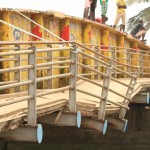Like the Adomi Bridge that connects the east and west sides of the Volta River near Akosombo in the Eastern Region, the Benya Bridge connects not only Elmina Town to Market Centre and all areas beyond in, but is also key to reaching the prime tourist centre and its clearance – under the bridge – allows fishing canoes and trawlers to go from the sheltered lagoon and out to sea.
However, reports emanating from Elmina in the Central Region indicate that the Komenda-Edina-Eguafo-Abrem Municipal (KEEA) Assembly has closed it to vehicular traffic, and Elmina residents, especially fishermen and taxi drivers, are angry.
The residents, Today understands, are angry because if authorities had years ago heeded calls that the bridge needed repairs and servicing and taken action it would not have deteriorated to the current state where it has to be closed for thorough repairs.
Another reason why they are irate is that after the Assembly has closed the bridge, repair works are not proceeding as fast as is expected in the light of the fact that the Benya Bridge is economically the most strategic and busiest asset in Elmina.
According to the fisher folk, Elmina is the second busiest fishing community in Ghana after Tema in the Grater Accra Region.
Benya Bridge consists of a wider vehicular section flanked on either side by pedestrian walks.
The Central Regional Director of Ghana Highways Authority, Mr. Michael Okine, explained that they had to close the bridge because the pedestrian portions on either side had collapsed, and the bridge itself is severely corroded and broken in some sections.
About 70% of the bolts on the main bridge are also corroding making it weak and dangerous for cars using it.
“The entire bridge is weak and could collapse on any canoes and boats that pass under it, so after the inspections we decided to close the bridge down,” he pointed out.
Some residents who spoke to Today could not understand how the KEEA could be collecting tolls on the Benya bridge and watch it deteriorate, when they possibly had the resources to repair it sooner.
“They take money from there to do other things, but could not repair the money-maker itself,” one of the residents wondered.
Another resident, Rafael Davies, who claimed he was the one who painted the bridge on its completion in the year 2000, said there were several appeals, including even demonstrations, by residents to compel the Assembly to rehabilitate the bridge when the first cracks and signs of deterioration were spotted and reported; but to no avail.
“This steel bridge has seen no renovation since its construction,” Rafael Davies said, “if it had been well maintained by the Assembly [there would have been no reason] to close [it.”]
A taxi driver, Kow Mensah, explained that due to the bridge closure, people have had to alight at one side of the bridge and cross to the other side to pick another taxi to continue their journey, and it is raises the cost of trips.
The situation of trading women is worse, Kow Mensah said and explained that women who come to buy fish have to carry their heavy loads in basins and cross the bridge to the other side before boarding another vehicle to their various destinations.
So many people use the bridge to the hospital, Kow Mensah said. “What would we do about a pregnant woman in labour and the sick aged if a vehicle brings them to the other side of the bridge?” he wondered
A fisherman, John Quayson, pointed out that fishing would soon enter the bumper season in about three months. “If by that time, the bridge is not open it will cause a lot of problems to us [fishermen] since canoes and boats use the [clearance] of the bridge to go to sea.”
That could shut down economic activity in the entire region, since people come to Elmina from far and near during the season to buy fish.
On a recent visit to the Benya bridge, Today’s reporter observed heavy parking of vehicles, taxis and private cars, at both ends of the bridge making it difficult for incoming cars to have space to operate.
Tourists were also seen fighting for space to park their cars in order to cross the bridge to the Elmina Castle, while some women were carrying basins full of fish and using the pedestrian sides of the bridge to get to the other side.
The KEEA Coordinating Director, Alhaji Issah Musah, told the paper that his outfit realising the precarious state of the bridge referred it to the Bridge Maintenance Unit of the Ghana Highways Authority (GHA) who have now taken charge of it.
Briefing Today in his office last week Friday, the Central Regional Director of Ghana Highways Authority, Mr. Michael Okine, disclosed that after inspecting the bridge in February 2013, they decided to close it to vehicles last March for rehabilitation work to start.
He said the bridge has deteriorated faster than expected, because authorities did not enforce a ban on big and heavy duty vehicles using it.
Michael Okine said the steel bridge will be replaced with a concrete one, adding that he cannot say when construction will begin, but for now the steel plates on the bridge are going to be replaced to make it safe for pedestrians to use it.
Regional News of Friday, 12 April 2013
Source: todaygh
Elmina residents angry over closure of Benya Bridge

















